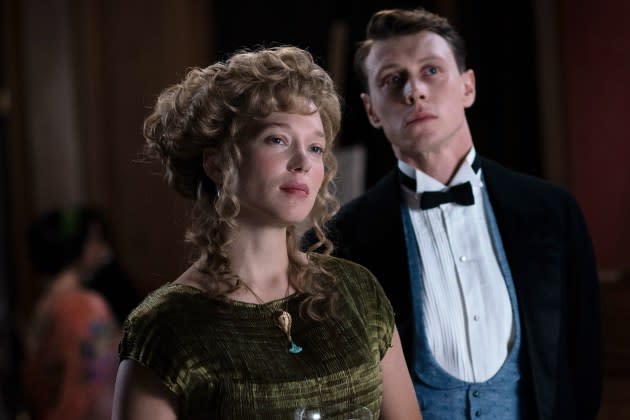‘The Beast’ Review: Bertrand Bonello’s Trippy Sci-Fi Offers A Lynchian View Of The Past, Present And Future – Venice Film Festival

Bertrand Bonello is a director, like Bruno Dumont, whose ascent to date has been quite closely associated with the Cannes Film Festival, so it is a surprise to see his latest — a two-hander starring French movie queen Léa Seydoux — make its debut on the Lido. It is sure to be just as divisive here as it would on home turf, but, for those willing to accept its longueurs and absurdities, The Beast is a provocative piece of sci-fi that follows Twin Peaks: The Return down the rabbit hole of dream logic, spanning three time zones in a surreal but compelling examination of human relationships.
Bonello announces his intent with a strange opening sequence, in which Seydoux, working with just a green-screen background, is directed in a scene that will reappear at the end of the movie. She’s in a house, alone, and “the beast” of the title is in there with her. Seydoux gives a pretty good account of herself, reacting to an imaginary intruder in a non-existent setting, and while it doesn’t make an obvious amount of sense, it does lay the groundwork for a film that frequently comments on its own artifice.
More from Deadline
The framing device is that, in the year 2044 — when society is ruled by AI, and humans have become largely irrelevant in the workplace, a woman named Gabrielle (Seydoux) is under pressure to undergo a process that will “clean” her DNA by forcing her to relive her past lives. It’s compared in the film to Buddhism, but there’s perhaps a closer connection to Scientology, which uses past-life regression to get rid of hang-ups and help participants to “go clear”. Gabrielle resists, for obvious reasons, afraid that she’ll lose those fragile elements of her personality that are shaped by her emotions.
As she succumbs, we first see her in 1910, at a society salon in Paris. Gabrielle is a famous musician, attending a preview of paintings by a new artist whose work is “as powerful and dark as the age is bright”. As she searches for her husband, she wanders through room after room, exchanging small talk with the fancily dressed guests, before meeting an intense young man named Louis (George MacKay), who insists they’ve met before. Gabrielle is not convinced, but Louis reveals some alarmingly intimate details about her, notably that she fears that some terrible fate or unnamable calamity — “the beast” — will come to claim her. The mood is strange and ethereal, drawing comparisons with Alain Resnais’ existential classic Last Year at Marienbad and threatening to be just as inconclusive.
The strike up a close friendship, one that borders on an affair, leading Louis to visit Gabrielle at the factory where her husband makes dolls out of celluloid and porcelain. It’s here, just as the film is threatening to turn into a cerebral period piece of the kind usually made by the likes of Arnaud Desplechin that Bonello flips a switch: Paris is severely flooded, the factory catches fire, and the couple are forced to fight for their lives.
This, though, is not the only time Gabrielle and Louis meet. They are reunited again, in much darker circumstances, in 2014. The setting this time round is Los Angeles, where Gabrielle is an aspiring actress, house-sitting for a very wealthy client, and Louis is a psychotic incel, who creates ever more disturbing videos declaring his hatred for women. This version of Louis believes he “deserves” a girlfriend, having done everything on a superficial level to help him in that quest. “Look how fabulous I look,” he says, in his designer duds, in a flash car, talking to the camera with the desperate, impassioned fervor of an ISIS martyr. After a chance encounter outside a nightclub, he settles on Gabrielle as the woman he will use to act out his vicious fantasies of violent retribution, so he follows her home.
Though we are now ostensibly in another time and another place, there are echoes here of 1910, and there will be echoes of both in 2044, which Bonello piles on to dizzying and grippingly visceral effect. Just as David Lynch deliberately eschewed literal sense in Lost Highway to portray the state of denial in a murderer’s mind, Bonello uses similar tricks to force us to wonder about the nature of destiny: are our lives essentially a Rubik’s cube, with 43 quintillion combinations of the same 54 elements? It’s a pretentious, disturbing, and strangely brilliant concept, notably in the recurring nightclub scenes where dancers seem locked in a timeless limbo where the playlist updates itself every time Gabrielle visits.
David Lynch did most of this too, in the brilliant Inland Empire, but Bonello puts his own spin on the material with a much more classic arthouse style. It’s sometimes too oblique to be totally satisfying, and the boyish MacKay is an odd choice for Louis in all his iterations. But Seydoux is a revelation, and the sense of trepidation and fear in her eyes does the lion’s share of the work in terms of assuring us that, whatever form it might take, “the beast” is real — and it’s out there.
Title: The Beast
Festival: Venice (Competition)
Director/screenwriter: Bertrand Bonello
Cast: Léa Seydoux, George MacKay, Guslagie Malanda
Running time: 2hr 25 min
Sales Agent: Kinology
Best of Deadline
Venice Film Festival 2023 Photos: David Fincher, ‘The Killer' & 'The Beast' Premieres
2023 Premiere Dates For New & Returning Series On Broadcast, Cable & Streaming
Sign up for Deadline's Newsletter. For the latest news, follow us on Facebook, Twitter, and Instagram.

 Yahoo News
Yahoo News 